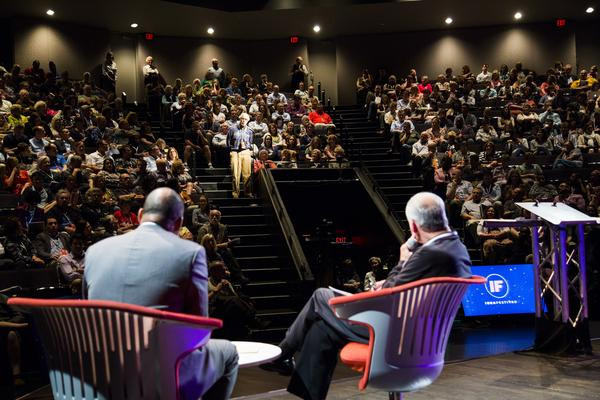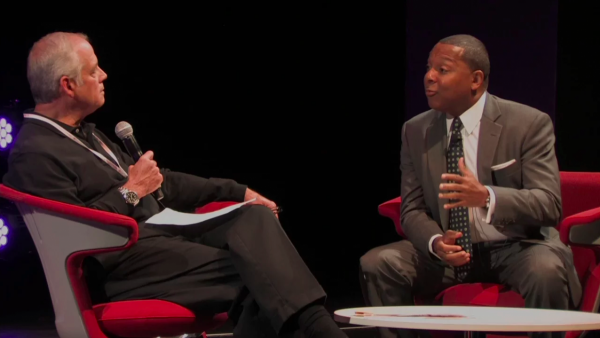IdeaFestival: Wynton Marsalis’ key to success — ‘Don’t have anything to fall back on’

Wynton Marsalis fielded a question from an audience member (photo: Tim Harris)
James White, head of Louisville Collegiate School, once was asked who he would change places with for one day if he had the option.
His answer: Acclaimed jazz trumpeter Wynton Marsalis.
“To be able to play like you one day would be the story of my life,” White told a visibly humbled Marsalis during a session at IdeaFestival in downtown Louisville Wednesday afternoon.
The musician, composer, bandleader and music educator answered questions from an enraptured crowd at the Kentucky Center for the Performing Arts, offering insights on his upbringing in the jazz community, his influences, art’s influence on society and technology’s impact on the future of music, among other topics.
The essence of jazz
Early in the conversation, the New Orleans-born Marsalis was asked to give his definition of jazz.
Jazz, he said, is a complex arrangement of integrated components built around improvisation that is supported by swing. The swing, he added, gives “democracy” to the music and ensures it doesn’t devolve into jumbled chaos.
“Yes, you have freedom,” he told the crowd. “But others have freedom, too.”
The third element is the blues, which reflects the philosophy of jazz culture to stay positive in the midst of adversity.
“This is life,” he said. “Bad things happen.”
Branching off of the blues are the spiritual, or soul, elements of jazz, he said. You can improvise with the best of them and capture great form in your music, he said, but without soul you miss the meaning.
Keeping creativity in schools
White asked Marsalis how one can keep creativity in schools when so many of the directives and rules placed on institutions discourage creativity.
With a gentle nod of his head, Marsalis said he encourages educators to let their students think for and express themselves in the classroom.
He also supported teaching from a positive frame of reference by inspiring confidence in students rather than focusing so heavily on critiques, saying more time should be placed on the celebration of creativity.
He learned that supportive nature from his peers and predecessors in the jazz culture. While they are competitive with one another, they wholeheartedly embrace the notion of joining together as a community to better each other, reveling in the mastery of each other’s talents, he said.
Embracing his talent and cultivating his influences
All arrogance aside, Marsalis said, he was good at anything he tried his hand at growing up as the son of a jazz musician, Ellis Marsalis Jr., in New Orleans.
He could throw a baseball, shoot a basketball or swing a mean hook if the occasion called for fighting.
“I (knew how to) handle myself,” he said.
But he never viewed his proficiency from a lens of hubris, he said, because he grew up surrounded by talent. His father, of course, could play music, his mother was acutely intelligent, and he knew a young man nicknamed “Big Stevie” who could recite any Stevie Wonder song you could think of.
In music, he said, his father and various trumpeters he got to know in the New Orleans music scene influenced him. He also listened to recordings from genre luminaries such as Miles Davis and Clifford Brown. In time, he reached back to the pioneers of jazz, such as Louis Armstrong and Roy Eldridge. When he first was exposed to those forebears of the genre, he said, he did not have the proper respect for their contributions.
“Expand your circle of listening,” he said.
Beat the rut, follow your dreams
During the hourlong session, several music students asked Marsalis for advice on playing techniques.
But others offered deeper questions, such as how do you pursue a dream when so many around you say it’s a waste of time and effort?
Marsalis said you must commit your full energies to any dream and see it through to its realistic end.
Simply put, “don’t have anything to fall back on,” Marsalis said, drawing a round of applause.
When asked how to avoid a rut, he encouraged those in the crowd to surround themselves with passionate, creative people who produce brilliant work, saying he “never gets in a rut.”
Toward the end of the session, a young musician in the crowd relayed how the belittlement of a music teacher drove him to hate the piano and stop playing.
Marsalis apologized on behalf of the teacher but said anyone who has a bad experience can learn from it and use it to create a new, more positive experience.
“The piano doesn’t care about you or your teacher,” he said.
Technology’s role on music
Marsalis said jazz increased its influence as technology developed. The genre benefited from the advent of the microphone and the radio, and compact discs allowed more music to be condensed on one recording, he said.
Technology now allows for the creation of synthetic and electronic music through the use of computers, and Marsalis said he is not opposed to this evolution. He said it is fun to play with music, patching beats and sounds together.
But he said he does not want to see playful experimentation trump a focus on music education and musical history.
“My only concern is personal fun replacing music,” he said.
‘Top of the heap’
Marsalis drew a standing ovation when the session ended, and IdeaFest founder Kris Kimel told the crowd they had witnessed something “magical.”
After the session, Marsalis met with fans individually, and visitors discussed among themselves how moved they were by his words.
“I was caught completely off guard by how good it was,” said Roman Irvin, an Atlanta resident whose family lives in Louisville.
Irvin said he was impressed by Marsalis’ insightful words and his openness with the crowd about his family and musical background.
“I have the whole conversation recorded,” Irvin said. “I can’t wait to listen to it again.”
Bruce Cohen, a licensed master plumber with Louisville-based BC Plumbing Co., has been coming to IdeaFest for eight years and said Marsalis led one of the most impressive sessions he has seen, describing it as “top of the heap.”
Marsalis was spot on in his musings on life, society and the arts, Cohen said, and his remark captured the essence of IdeaFestival. “This is what it’s all about.”
Source: Bizjournals.com


Comments
Can´t post on tw/fb, so….. use this new´s space to comment St.L. gig and livestreaming……and just to say …….thank youuuuuu!!!!!!….for a first row seat of a great concert. Best one since summer. Wynton…..You´r the top…….
Best and take care.
MTSCR
MTSCR on Oct 3rd, 2014 at 7:40pm